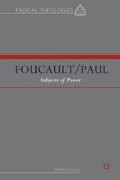Abstract
The next stage in the critical encounter staged between Foucault and Paul involves mapping out a conception of power that is not confined by existing categories of theology or philosophy. The aim here is to move toward an understanding of power that has more practical applications. How might we act politically and ethically within existing power structures? Indeed, how is it possible to act politically and ethically at all? However, before arriving at this point that constitutes the focus of chapter 4, it is first necessary to work through a number of key critical considerations concerning both the function and identity of power. It is power, after all, that is really what is at stake for both Foucault and Paul. Questions of life and death may constitute the motivation, the driving force behind their thought, but it is power that provides them with the means of articulating these questions. Power is the instrument, the conceptual tool, employed by Foucault and Paul to make sense of their worlds. Paul uses the term power “δύναμις” to explain God’s intervention in the world. Foucault uses the term “pouvoir” to explain how a society functions according to specific discourses or “truths.” As such the role of power cannot be underestimated in either of their works. Power is everywhere and in everything. There is nothing outside of power.
The man described for us, whom we are invited to free, is already in himself the effect of a subjection much more profound than himself.
(DP, 30)
He will transform the body of our humiliation that it may be conformed to the body of his glory, by the power that also enables him to make all things subject to himself.
(Philippians 3:21)
Access this chapter
Tax calculation will be finalised at checkout
Purchases are for personal use only
Preview
Unable to display preview. Download preview PDF.
Notes
Patrick ffrench, The Cut: Reading Bataille’s Histoire de l’Œil (Oxford: Oxford University Press, 2000), 101.
Nick Crossley, “The Politics of the Gaze: Between Foucault and Merleau-Ponty,” Human Studies, 16.4 (October 1993), 404.
In Galatians 3:13, Paul makes a reference to Deuteronomy 21:23, which states that “anyone hung from a tree is under God’s curse.” Gorman also emphasizes the significance of crucifixion under the Pax Romana as something that is frequently overlooked by modern commentators. Michael J. Gorman, Cruciformity: Paul’s Narrative Spirituality of the Cross (Grand Rapids, MI, and Cambridge: Eerdmans, 2001), 5.
Ernst Käsemann, Perspectives on Paul (London: SCM Press, 1971), 18.
David Couzens Hoy, “Power, Repression, Progress: Foucault, Lukes, and the Frankfurt School,” in Foucault: A Critical Reader, edited by David Couzens Hoy (Oxford: Basil Blackwell, 1986), 129.
Louis Althusser, “Ideology and Ideological State Apparatuses (Notes towards an Investigation),” in Lenin and Philosophy and other essays, translated by Ben Brewster (London: NLB, 1971);
Judith Butler, The Psychic Life of Power (Stanford, CA: Stanford University Press, 1997), 109.
Rudolph Bultmann, Theology of the New Testament, translated by Kendrick Grobel, 2 vols. (London: SCM Press, 1965), I, 191.
John A. T. Robinson, The Body: A Study in Pauline Theology (London: SCM Press, 1977), 11.
Robert H. Gundry, Sōma in Biblical Theology: With Emphasis on Pauline Anthropology (Cambridge: Cambridge University Press, 1976), 50 and 80.
Scott Lash, “Genealogy and the Body: Foucault/Deleuze/Nietzsche,” Theory, Culture and Society, 2.2 (1984), 6.
See Maurice Merleau-Ponty, Phenomenology of Perception (London and New York, NY: Routledge, 2002).
Daniel Boyarin, A Radical Jew: Paul and the Politics of Identity (Berkeley and London: University of California Press, 1994), 56.
Krister Stendahl, Final Account: Paul’s Letter to the Romans (Minneapolis, MN: Fortress Press, 1995), 2.
Judith Butler, Gender Trouble: Feminism and the Subversion of Identity (New York, NY, and London: Routledge, 1999), 181.
Dan Beer, Michel Foucault: Form and Power (Oxford: Legenda, 2002), 81.
Walter Wink, Naming the Powers: The Language of Power in the New Testament (Philadelphia, PA: Fortress Press, 1984), 46.
Stephen D. Moore, Poststructuralism and the New Testament: Derrida and Foucault at the Foot of the Cross (Minneapolis, MN: Fortress Press, 1994), 93.
C. H. Dodd, The Epistle of Paul to the Romans (London: Hodder and Stoughton, 1932), 22–3.
Anthony Tyrell Hanson, The Wrath of the Lamb (London: S.P.C.K., 1957), 68.
John Milton, The Complete Poems (London: Penguin Books, 1998), 119–462.
E. P. Sanders, Paul and Palestinian Judaism: A Comparison of Patterns of Religion (London: SCM Press, 1977), 442ff It is worth noting that Sanders is responding in particular to Rudolph Bultmann’s attempt to think Paul’s understanding of salvation the other way around, from plight to solution.
See for example, James D. G. Dunn, “Who Did Paul Think He Was? A Study of Jewish-Christian Identity,” New Testament Studies, 45.2 (March 1995), 174–93; Dunn, Theology of Paul, 536.
James D. G. Dunn, “Once More, ΠΙΣΤΙΣ ???Σ???,” in Pauline Theology Volume IV: Looking Back, Pressing On, edited by E. Elizabeth Johnson and David M. Hay (Atlanta, GA: Society of Biblical Literature, 1997), 74.
For a detailed discussion of Galatians 2.16, see Richard B. Hays, The Faith of Jesus Christ: An Investigation of the Narrative Substructure of Galatians 3:1–4:11 (Chicago, CA: Scholars Press, 1983), 141–2.
Richard Kearney, “Paul’s Notion of Dunamis: Between the Possible and the Impossible” in St Paul among the Philosophers, edited by John D. Caputo and Linda Martin Alcoff (Bloomington: Indiana University Press, 2009), 142.
Todd May, Gilles Deleuze: An Introduction (Cambridge: Cambridge University Press, 2005), 57.
Copyright information
© 2013 Sophie Fuggle
About this chapter
Cite this chapter
Fuggle, S. (2013). Power. In: Foucault/Paul. Radical Theologies. Palgrave Macmillan, New York. https://doi.org/10.1057/9781137323408_4
Download citation
DOI: https://doi.org/10.1057/9781137323408_4
Publisher Name: Palgrave Macmillan, New York
Print ISBN: 978-1-349-46006-9
Online ISBN: 978-1-137-32340-8
eBook Packages: Palgrave Religion & Philosophy CollectionPhilosophy and Religion (R0)

